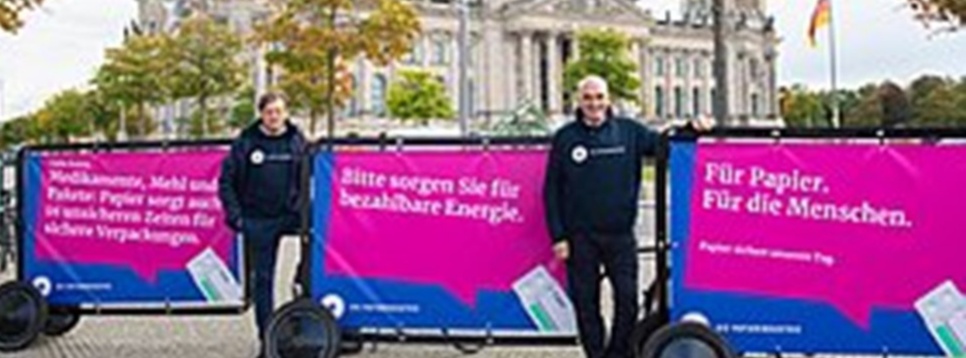Paper industry presents position paper for viable energy policy
News General news
THE PAPER INDUSTRY Association has presented a position paper "Reset in Energy Policy" outlining the framework for a future energy policy that preserves Germany as an industrial location.
President Winfried Schaur (r.) and HGF Alexander von Reibnitz presented the demands.

THE PAPER INDUSTRY Association has presented a position paper "Reset in Energy Policy" outlining the framework for a future energy policy that preserves Germany as an industrial location. "As an energy-intensive industry, we are highly dependent on a secure and affordable energy supply. That is why we have now drawn up a position paper that will be given to politicians as food for thought," said the association's president, Winfried Schaur, at a meeting with the economic and energy policy spokesmen of the CDU/CSU, SPD, Bündnis90/Die Grünen and FDP parliamentary groups in the Bundestag.
The German paper industry recognizes the efforts of the German government, the paper says. However, it warns against losing sight of the medium-term structural challenges facing Germany as an industrial location in the current emergency. In addition to security of supply, a consistent energy policy must continue to focus on competitive energy prices. Specifically, the association proposes the following measures:
Short-term:
- Germany urgently needs more base-load-capable power generation capacity on the electricity market that is independent of Russian energy imports. This means that the decommissioned lignite and hard coal-fired power plants in particular must be brought back online as quickly as possible. But the nuclear power plants that will be shut down at the end of 2021, as well as the three that are still operating (totaling around 10 GW), must also continue to be used for power generation as a bridging technology. Their operation supports the base load, increases security of supply and has a price-dampening effect.
- Decisions to reduce conventional power generation must be reviewed at regular intervals depending on the actual additional secured and base-load-capable output of renewables.
- The electricity market design must be put to the test and pricing adjusted to a changed generation mix.
- Peak compensation for energy-intensive industry must be extended for at least two years.
- The Federal Network Agency must make full and immediate use of the leeway created by the Ersatzkraftwerkebereithaltungsgesetz in the 7,000h rule for 2022.
- To safeguard the competitiveness of the German economy, an industrial electricity price must be introduced promptly and a relief mechanism for the enormously high gas prices must be developed.
- Policymakers must swiftly develop new scenarios for secure electricity production, also taking into account worst-case scenarios in the European context.
Medium-term
- The expansion of renewable energies must be driven forward with vigor and a strong acceleration of the approval procedures. In the process, capacity targets must be realistically evaluated.
- New forms of stabilizing the energy supply (power-to-X) must be realistically included and transition scenarios thought through.
- Increased domestic gas production (offshore, shale gas, etc.) must be actively pursued.
- Companies must be financially supported to further reduce their dependence on fossil raw materials in process operations (steam, drying, etc.) and to accelerate the transition to electricity-based processes. This is the only way to increase the speed of transformation.










